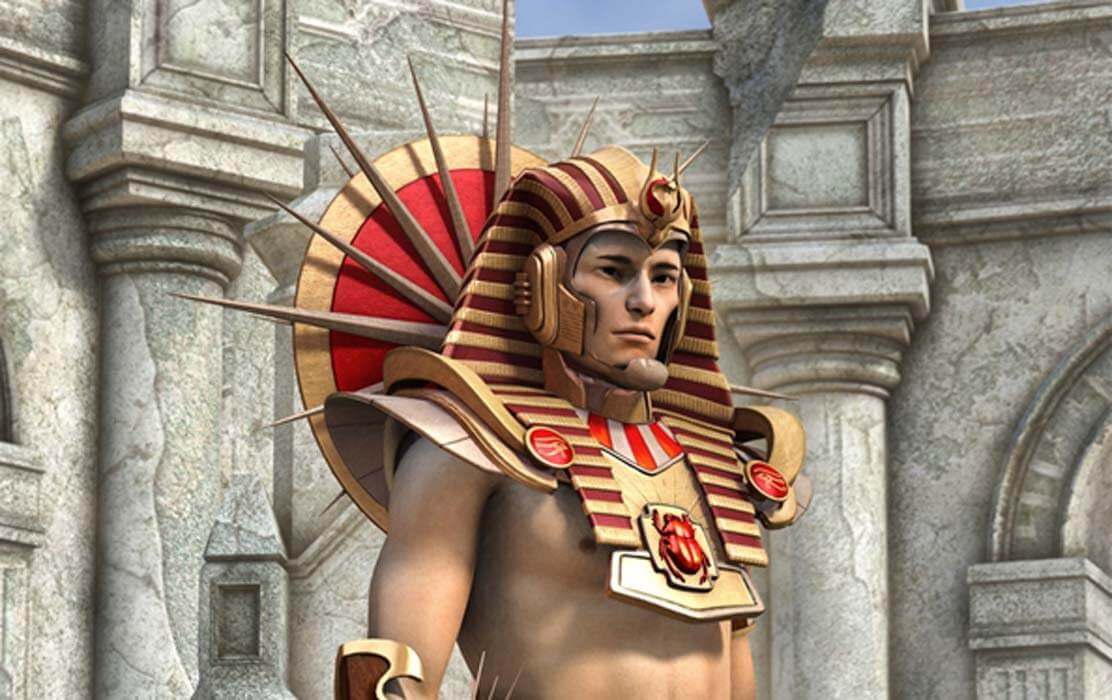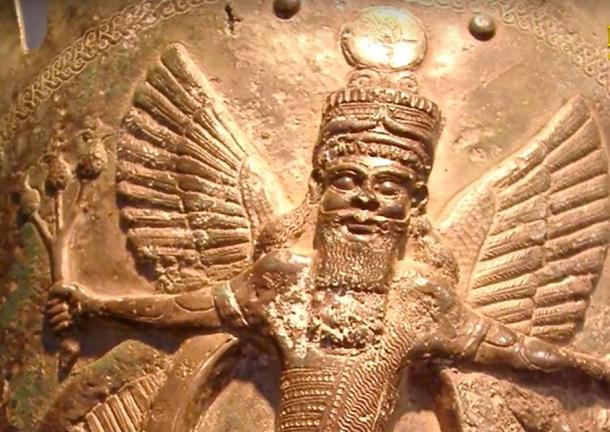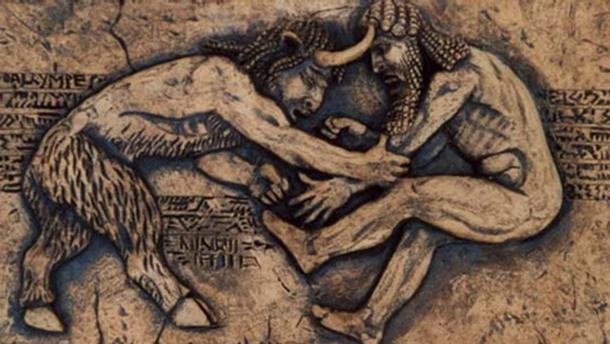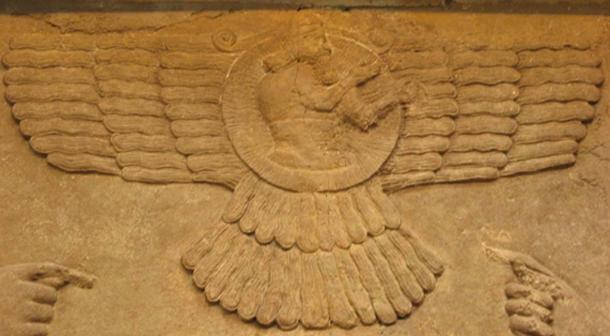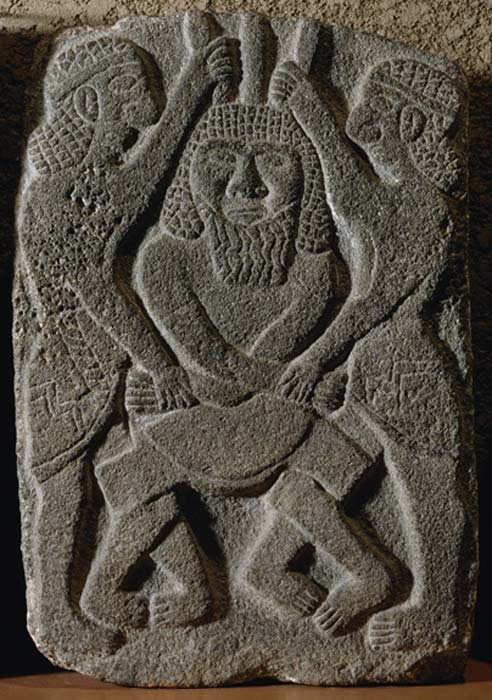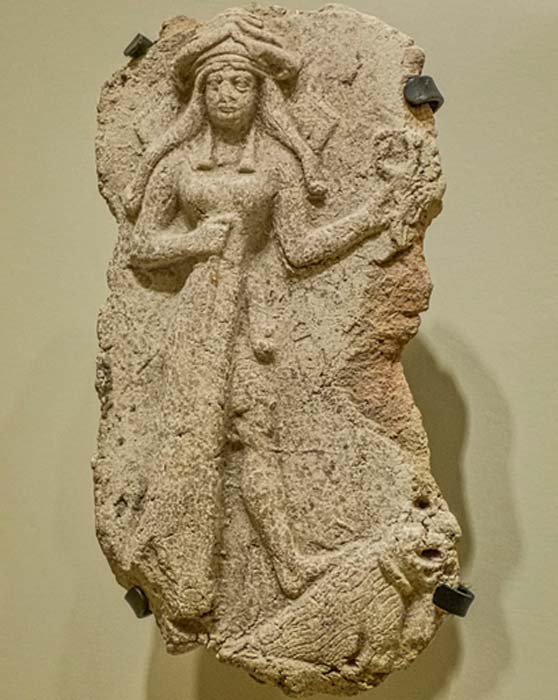The Epic of Gilgamesh is regarded as one of mankind’s greatest literary and historical works. Many authors have studied the text in an effort to explain the nature of Gilgamesh’s tyranny and his erratic behavior.
‘The nature of Gilgamesh’s tyranny is not explained by the author, as it appears not necessary to know more than that he is a tyrant’. Andrew George, Translator
In contrast to many theorists, this unconventional retelling of key parts of the Epic explores the idea that Gilgamesh was not searching for life eternal on Earth, as has been suggested as the theme of the Epic, but was instead searching for the means of transport to return to his goddess mother Ninsun’s home planet in the heavens. It seeks to demonstrate that the Epic explains how humans were created and how many afflictions that affect humans, such as infertility, can be directly attributed to the gods.
Gilgamesh and the Nephilim In the Beginning
Gilgamesh ruled in Sumer, in the city of Uruk, for 127 earth years, and is the greatest of all kings. As stated in the Epic, he was born two-thirds a god and one-third human. To understand this the epic, it is necessary to examine the legend of Gilgamesh’s birth and the principal characters – who they were and where they came from.
The Nephilim were on the Earth in those days and also afterward. (Nephilim is translated as ‘those who from the heavens came’).
“When the sons of the gods saw that the daughters of men were beautiful and comely they took them as they so desired and children were born to them, these were the mighty men of old men of renown!”
The Nephilim. (Disclosed TruthTV / YouTube Screenshot )
The Nephilim who had arrived on Earth from the heavens above were space travelers who kept their rocket ships and spacecraft heavily guarded and hidden in the mountains, away from human activity.
“A drawing found in the tomb of an ancient Egyptian shows a rocket head above ground in a place where trees grow. The shaft of the rocket is clearly stored underground, in a manmade silo constructed of tubular segments and decorated with leopard skins.”
Gilgamesh’s mother, Ninsun (‘wild cow of the fold’), was a goddess, cousin of the god Enlil, the divine ruler on Earth, and his father an earthling priest. She came from a planet in outer space and had arrived by space travel as part of the group who had come to the Earth to mine for certain minerals needed for their own planet’s survival. As a child at his mother’s knee, Gilgamesh would have heard all the stories of where his mother came from and all the godly benefits he would receive when he became king, as was his birthright.
And so, it came to pass that Gilgamesh, a demi god, fifth in the line of kings, ruler of Sumer, in the city of Uruk, would take out his frustrations by day in killing the young men in joust and by night raping the young women (‘ius primate noctis’, ‘the right of first night’).
In an effort to control her son’s tyrannical behavior, Gilgamesh’s mother wanted him to be able to visit her home planet, as she had promised him as his right of kingship. But after realizing that all her pleadings to Enlil for Gilgamesh be allowed to visit their home planet had failed (as by his decree no humans were allowed to leave the Earth), Gilgamesh’s mother decided that he needed a companion to be an equal and be able to compete on equal terms.
Gilgamesh’s Mother Creates Enkidu
To the creation chamber she went where the first Homo sapiens had been genetically designed. Using ovum from an earthling female and semen from a minor god, a fertilized egg is created using a process similar to modern day in vitro fertilization and is implanted into a surrogate earthling female. In the wild, he was born Enkidu, the hero friend for Gilgamesh. (Enuma Elish. Epic Of Creation).
“You spawn of a fish who knew no father hatchling of a terrapin and turtle, who sucked no mothers milk.”
In the wild, Enkidu cavorted with the animals and lived off the land, destroying the local huntsman’s animal traps. “He is like a rock from the sky, a mighty man equal in stature to Gilgamesh, and I was afraid,” complained the hunter to his father. “Go into Uruk and inform Gilgamesh of what is happening, and he will be able to help solve this situation.”
Gilgamesh and Enkidu wrestling, modern ceramic relief. (Image: NielDalrymple)
It was given to Shamhat, a priestess in the temple at Sumer, to enlighten Enkidu of his humanity, and bring him to Uruk to meet the king. The hunter took Shamhat to the waterhole to await the arrival of the wild man and his animal friends, and in due course they arrived. Upon seeing Shamhat, who had disrobed, Enkidu’s curiosity was aroused and he approached her.
“This is he, Shamhat! Uncradle your bosom, bare your sex, let him take in your charms! Spread your clothing so he may lie on you, do for the man the work of a woman!”
As a result of his sexual behavior, Enkidu was shunned by his animal companions. They fled when he approached and as he was not able to run with them, Enkidu returned to Shamhat. This was to become the second stage of his life, from a Homo sapiens, to a Homo sapiens sapiens.
They returned to the hunter’s village where Enkidu was fed and clothed and instructed by Shamhat in the ways of mankind and of Gilgamesh, king of Uruk, who was to become his friend and companion. Enkidu had no idea of what to do with the bread and wine he was given, as he lived off the fruits of the land, as did the animals. Shamhat said to Enkidu, “eat the bread, essential to life, drink the wine, the lot of the land.”
Enkidu ate and drank a full seven goblets, until he was fully sated. His heart grew merry as he sang and danced. He was showered, shaved, anointed with oil, and clothed, and armed with weapons, becoming like a god.
They continued their journey and as they approached the city, Shamhat informed Enkidu that a betrothal was about to take place and that Gilgamesh would be duly seeking his ‘right of first night’. At the house of the maiden Enkidu blocked Gilgamesh’s way, and as they were both heavily armed he was surprised when Gilgamesh discarded his weapons. He was further surprised when Gilgamesh told him that the gods settled all their disputes by wrestling.
The walls shook and the doors rattled, as the two men went ‘hammer and tongs’, one after the other getting the upper hand, before exhausted they halted the affray, evenly matched. They stood up and embraced, Gilgamesh knowing that at last he had an equal and companion who would become his friend.
Gilgamesh invited Enkidu back to his palace, and it was while they were having a drink , and a general ‘get to know you’, that Enkidu told about one of his adventures in the mountains of Lebanon. He had discovered that the forest of cedars was guarded by a ferocious warrior with weapons that could destroy a city, and that no living soul could enter, man or beast.
Gilgamesh Learns the Location of the Portal
Gilgamesh knew at once what was being guarded and it was not trees! This is what he had been searching for but had never been able to discover; the hiding place where the gods had their method of transport hidden, rocket ships and spacecraft, which they used to travel back and forth to their home planet. He immediately invited Enkidu to take up residence and showed him his suite of rooms and all the benefits befitting a king, with the provision that Enkidu take him to the heavily guarded site in Lebanon.
This was not what Enkidu had expected. He suggested that they should go on a different journey, not as dangerous where they would certainly be killed. However, Gilgamesh would not have anything change his mind. He knew that this was the chance of a lifetime, where all his desires would be fulfilled, and he would receive a ticket to travel to his mother’s home planet.
Gilgamesh’s mother realized when he came to tell her the news of his discovery, that he would be going to his death. She tried to talk him out of going but when she realized it was futile she insisted that he must take Enkidu and also some of his men.
She also went to see Shamash, the commander in chief of all the space stations on earth, to make one last plea to get a ticket for Gilgamesh to travel to their planet, well knowing that no earthling was allowed to leave the planet by order from Enlil. This was further endorsed by the refusal from Shamash. However, he did promise to protect Gilgamesh as best he could if he continued on his precarious mission to the mountains of Lebanon.
Gilgamesh’s mother went to plead with Shamash. (Capillon / Public Domain )
The journey begins. Gilgamesh and Enkidu set out for Lebanon, a journey of over 3750 kilometers (2330 miles), which would take them 15 days, averaging 250 kilometers (155 miles) per day. On the third night, Gilgamesh dreamed a dream of a god passing. His heart stopped beating and he froze. “Why was this?” he asked. Enkidu, wise and knowing, convinced him that all was well, and they continued their march.
Gilgamesh was not so sure as the dream was repeated on the sixth night. A god passed by and he froze. “Why is this happening? Why do I feel their wrath?” Enkidu reassured him that all was well, and the gods were protecting him.
On the ninth day out, Gilgamesh dreamed a dream. A god passed by and he froze. It was utter confusion. The heavens cried aloud, the earth rumbled, lightening flashed, fire broke out, flames flared up, and death rained down.
The wise Enkidu gave him the meaning. It was a good omen, as they were nearing their destination the gods were guaranteeing their protection and victory over the ferocious Humbaba, guardian of the cedar forest.
They continued on their way, and on the evening of Gilgamesh’s fourth dream, it was like no other. It surpassed the other three, a god passed by and his flesh was frozen numb! A thunderbird rose in the cloud soaring above, its mouth was fire, its breath was death.
Gilgamesh now sees for the first time a god in a space suit, “he was strange of form as he stood there in my dream and he took my arm.” The all-wise Enkidu quickly told him that it was Shamash who had taken his arm. Not that Enkidu had ever met or seen Shamash, however he had all wisdom and knowledge as he was the epitome of the Homo sapiens.
The reckoning with Humbaba was at hand and the prize was to be won, a ticket for Gilgamesh on the next space craft traveling to his mother’s home planet. The one crucial advantage that Shamash had given to Gilgamesh was that because all the rocket ships and space craft had left and were orbiting in space, their automatic weapon protection had shut down to be rearmed on their return.
Humbaba, on coming out of his fortification to meet and greet Gilgamesh and Enkidu, was surprised to see that they were preparing for battle.
“You spawn of a fish who knew no father, hatchling of terrapin and turtle, who sucked no mothers milk. You who were given the ‘ART OF SPEECH’. I should have tied you to a tree and let the ravens peck out your eyes, you are no match for me.”
Gilgamesh and Enkidu prevailed upon Humbaba, and even though he begged for mercy from Gilgamesh, when it seemed he would grant Humbaba his request, Enkidu refused as he knew the great god Enlil would not look favorably on what had taken place.
Gilgamesh and Enkidu fight with Humbaba. (Walters Art Museum / Public Domain )
After they had killed Humbaba, and entered into the forest, to the dismay of Gilgamesh it was deserted. He had been thwarted by the gods again. Gilgamesh had not yet realized that it was his one third humanity that was his Achilles heel, preventing him from leaving Earth for his mother’s home planet.
Homeward bound and onward to another adventure, Gilgamesh and Enkidu took with them a cedar tree from the forest, as that was the purpose of their trip, Enkidu reminded Gilgamesh.
As they neared Uruk, Ishtar, the goddess of love and war, propositioned Gilgamesh, who scorned her advances, reminding her of all her past lovers whom she had discarded.
“On the beauty of Gilgamesh, Lady Ishtar looked with longing: Come, Gilgamesh, be you my groom! Oh, grant me your fruits.”
Gilgamesh rejected Ishtar and she fled. (Mary Harrsch / CC BY-SA 2.0 )
Gilgamesh was not thinking clearly. Still smarting from his obvious disappointment, he missed another opportunity to leave Earth, by refusing to take up Ishtar’s proposal. Enraged by being rejected and insulted, Ishtar rushed to her spacecraft and ascended to the heavens to her home planet and to her parents, Anu, the most high god of the heavens and Earth and Antu, her mother.
Part two of this interpretation of the Epic of Gilgamesh will continue with further tales of Gilgamesh’s tangles with the gods in his journey of sef-discovery.
|
Listen to this post
|

